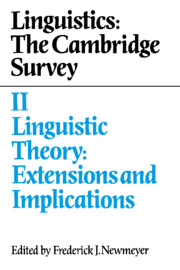Book contents
- Frontmatter
- Contents
- Contributors
- Preface
- 1 Extensions and implications of linguistic theory: an overview
- 2 Grammar and language processing
- 3 Grammatical principles of first language acquisition: theory and evidence
- 4 Second language acquisition and grammatical theory
- 5 Brain structures and linguistic capacity
- 6 Abnormal language acquisition and the modularity of language
- 7 Grammatical aspects of speech errors
- 8 Grammar and conversational principles
- 9 Discourse analysis: a part of the study of linguistic competence
- 10 Speech act distinctions in grammar
- 11 Computer applications of linguistic theory
- 12 Metrics and phonological theory
- 13 Grammatical theory and signed languages
- 14 The linguistic status of creole languages: two perspectives
- 14.I Creole languages and the bioprogram
- 14.II Are creoles a special type of language?
- 14.III A dialog concerning the linguistic status of creole languages
- Subject index
- Name index
- Contents of volumes I, III, and IV
5 - Brain structures and linguistic capacity
Published online by Cambridge University Press: 08 February 2010
- Frontmatter
- Contents
- Contributors
- Preface
- 1 Extensions and implications of linguistic theory: an overview
- 2 Grammar and language processing
- 3 Grammatical principles of first language acquisition: theory and evidence
- 4 Second language acquisition and grammatical theory
- 5 Brain structures and linguistic capacity
- 6 Abnormal language acquisition and the modularity of language
- 7 Grammatical aspects of speech errors
- 8 Grammar and conversational principles
- 9 Discourse analysis: a part of the study of linguistic competence
- 10 Speech act distinctions in grammar
- 11 Computer applications of linguistic theory
- 12 Metrics and phonological theory
- 13 Grammatical theory and signed languages
- 14 The linguistic status of creole languages: two perspectives
- 14.I Creole languages and the bioprogram
- 14.II Are creoles a special type of language?
- 14.III A dialog concerning the linguistic status of creole languages
- Subject index
- Name index
- Contents of volumes I, III, and IV
Summary
Introduction
The linguistic capacity of human beings is a biological endowment. The normal child placed in a typical speech community will acquire the language of that community in a consistent fashion. While the specific language a child acquires is a function of the linguistic environment, how any child acquires any language is, in fundamental respects, the same. Acquisition can be impaired either by deprivation of linguistic experience or by various forms of anomaly in the central nervous system. Observation of the everyday experience of human language acquisition provides, then, compelling evidence of a biological foundation for language. Linguistic capacity is, in fact, not unlike a host of other biological capacities: the organism encounters experience with a physical system poised to engage with that experience and develop in consequence of it. It is therefore of consequence to explore the biological foundations of language if we are to gain a clear understanding of the structure of human linguistic capacity.
It is impossible to study the functional structure of any biological system in the absence of some concept of the function being subserved. Little follows directly for the analysis of particular behavioral systems from simply looking at neurons, collections of neurons, their physiological properties, or their chemistry. Thus, consideration of the biological foundations of language requires that we have at the outset some behavioral conception of human linguistic capacity. Led by the extensive work of Chomsky, over the last quarter century, considerable research on the theory of grammar has been dedicated to providing a formal account of the endowment which a child brings to the task of language acquisition (Chomsky 1965, 1985).
- Type
- Chapter
- Information
- Linguistics: The Cambridge Survey , pp. 74 - 95Publisher: Cambridge University PressPrint publication year: 1988
- 1
- Cited by



